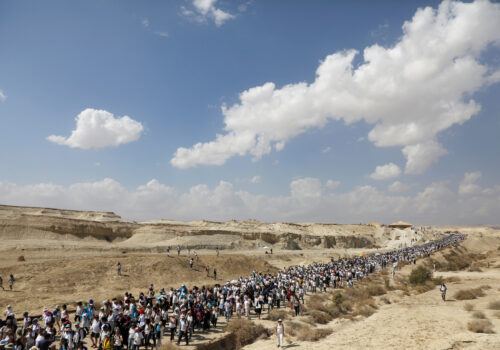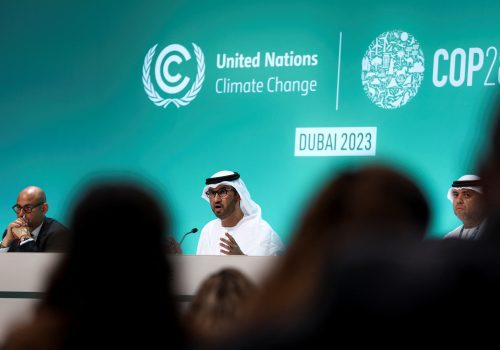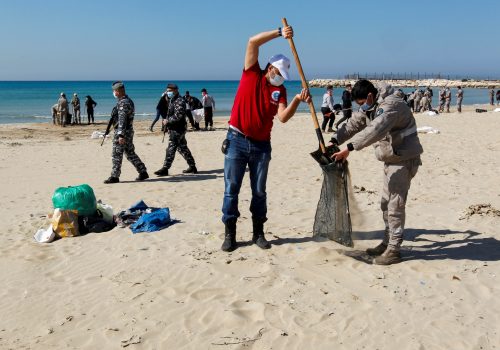The double costs of conflict-driven climate change in MENA and beyond
While much of the world’s attention was on the ongoing Gaza war, the Middle East and North Africa (MENA) region was also dealing with unprecedented heavy rainfall in the United Arab Emirates and surrounding countries this month, coupled with record heat waves throughout the region. These events were stark reminders of the climate change challenges faced not just by the region but the world.
With wars raging in Ukraine since 2022 and in Gaza since October 2023, not to mention other conflicts, one question that comes to mind is the cost in terms of climate change. First, direct conflict-related emissions from military equipment, damage to facilities that cause emissions—such as fuel reserves and chemical plants—or fires, and a reversion and reliance on carbon-heavy fuels, including coal. Most estimates quantify emissions from the Ukraine conflict, for example, as equivalent to Belgium’s annual emissions. The other is the opportunity cost of the lack of cooperation on climate issues across borders. (For more on this topic, see the author’s forthcoming report for the Atlantic Council to be released in summer 2024.)
SIGN UP FOR THIS WEEK IN THE MIDEAST NEWSLETTER
As long as Israel and Lebanon, for example, cannot agree how to cooperate on optimizing exportation from the region and eventually transition out of natural gas reserves from any shared sources towards cleaner sources of energy, both countries and the wider region will lose. (It’s worth noting that under the important Lebanese-Israeli Maritime Agreement, brokered by the United States, there are some provisions for how the parties will exploit any said gas fields and any revenue therein, but as long as the parties are not in direct contact and dependent on mediation, any additional prospect for cooperation beyond exploitation and border demarcation likely will be limited.) The same principle applies to cooperation in mitigation of extreme weather impacts through exchange of meteorological data, for example. The first cost is more straightforward to quantify, but the consequences of the second cost will only be assessed by future generations. These are the “double costs” of conflict-driven climate change impacts.
With the ongoing wars, it’s easy to dismiss the notions of climate change cooperation across borders as detached from reality. Unfortunately, the devastating impacts of climate change are not going away because of the existential threats posed by conflict. Instead, they are being worsened because of conflict.
For most countries, climate change has become a national security issue as they face mounting challenges from its impacts. In the MENA region, the risk for conflicts increases as the region becomes dryer, with scarcer sources of water, food, and energy. As the region looks to undertake an effective energy transition—which entails sharing of emission-reduction technology such as carbon capture, interconnecting electricity grids that are also capable to include increasingly renewable energy-based electricity, etc.—cooperation across borders becomes critical. Unless countries in the region and beyond find ways to work to mitigate and adapt together, it will turn into a race to the bottom—a lose-lose situation.
As long as the world has reckless and authoritarian leaders who are bent on continuing to rule by force and conflict, the rest of the world will suffer. Beyond the immediate loss of human life in conflict zones—including Ukraine, the Israel-Hamas war, Sudan, and Myanmar—other parts of the world will suffer the impacts of the “double cost” of climate change due to these events.
The trouble is that most politicians think short-term due to election cycles. So, medium- to long-term climate impacts are often not prioritized. Democratic countries governed by policies endeavoring to tackle climate change impacts can play an important role, as has been demonstrated by governments in Europe and North America. However, the continued success of such policies only works as long as a new government isn’t sworn in with a change of policy towards climate change, which undermines the milestones achieved. This was evident when then US President Donald Trump withdrew from the Paris Climate Accord in 2020. If he returns to the White House, Trump may repeal the Inflation Reduction Act, a move that would take away incentives for companies to invest in cleaner energies and, rather worryingly, send a strong signal to other global players that the United States is not a reliable partner for dealing with climate change.
A successful energy transition will address developing and developed economies’ current real energy needs, including hydrocarbons, for a defined period. However, it will critically establish medium- to long-term plans to scale up green energies. Moreover, democratic systems of government with policies and agendas in place to adapt and mitigate the effects of climate change would be wise to consider establishing mechanisms that help ensure the longevity of these policies beyond a change of government. This is a tall order to ask democratic governments to do, especially as the tools they have to limit the ability to reverse such policies are restricted. Nonetheless, the more such policies are enshrined, for example, in international relations, and with clear economic incentives, the more difficult it is to undo them.
While it is tempting to focus on the here and now, especially with respect to devastating live conflicts, it is critical to equally take steps to enable climate change mitigation and adaptation cooperation across borders—including across conflicting ones. Although nearly impossible to contemplate in the midst of conflict, this is precisely what needs to be done. Warmongering leaders in the region and beyond inflict not only direct losses today, but the impacts will be felt for generations to come. In the national security realm of climate change, this means that damage done to the planet is not just the direct emissions from conflict but also the opportunity cost of the lack of cooperation in dealing with the largest threat facing humanity. The “double costs” of conflict-driven climate change need to be understood and acted upon today in the MENA region and beyond.
Ariel Ezrahi is a nonresident senior fellow with the Atlantic Council’s Middle East Programs. Ezrahi currently serves as the director of climate strategy at a fintech fund. Ezrahi is also on the board of the MENA2050 Climate Action Committee and the chairman of its Energy Transition Subcommittee. He was the architect of the Gas for Gaza project, the inaugural director of energy at the Office of the Quartet, and the Energy Adviser to the Quartet Representative, former UK Prime Minister Tony Blair.
Further reading
Thu, Mar 7, 2024
While wars rage on, women wage peace in the Middle East
MENASource By Marcy Grossman
On International Women’s Day this year, the world needs more voices echoing the resounding calls for peace and justice in the face of ongoing conflicts.
Thu, Nov 30, 2023
COP28 is here. These are the Global South’s demands and expectations.
MENASource By Lama El Hatow
The COP28 negotiations will prove to be challenging given all the demands and expectations on the table in this COP.
Thu, Apr 22, 2021
The Middle East needs a Levant-North African Environmental Forum
MENASource By Ariel Ezrahi
Political borders will continue to exist and limit what can and cannot be done across such borders. However, there needs to be less thinking on national terms and more on local and regional terms when combating climate change.
Image: FILE PHOTO: Cars are stranded in flood water on a blocked highway following heavy rainfall, in Dubai, United Arab Emirates, April 19, 2024. REUTERS/Amr Alfiky/File Photo


